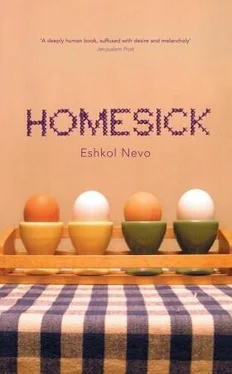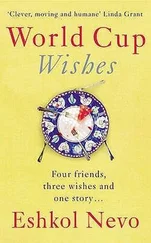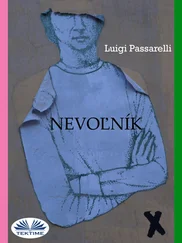Eshkol Nevo - Homesick
Здесь есть возможность читать онлайн «Eshkol Nevo - Homesick» весь текст электронной книги совершенно бесплатно (целиком полную версию без сокращений). В некоторых случаях можно слушать аудио, скачать через торрент в формате fb2 и присутствует краткое содержание. Год выпуска: 0101, ISBN: 0101, Издательство: Random House, Жанр: Современная проза, на английском языке. Описание произведения, (предисловие) а так же отзывы посетителей доступны на портале библиотеки ЛибКат.
- Название:Homesick
- Автор:
- Издательство:Random House
- Жанр:
- Год:0101
- ISBN:9781448180370
- Рейтинг книги:5 / 5. Голосов: 1
-
Избранное:Добавить в избранное
- Отзывы:
-
Ваша оценка:
- 100
- 1
- 2
- 3
- 4
- 5
Homesick: краткое содержание, описание и аннотация
Предлагаем к чтению аннотацию, описание, краткое содержание или предисловие (зависит от того, что написал сам автор книги «Homesick»). Если вы не нашли необходимую информацию о книге — напишите в комментариях, мы постараемся отыскать её.
Homesick
Homesick — читать онлайн бесплатно полную книгу (весь текст) целиком
Ниже представлен текст книги, разбитый по страницам. Система сохранения места последней прочитанной страницы, позволяет с удобством читать онлайн бесплатно книгу «Homesick», без необходимости каждый раз заново искать на чём Вы остановились. Поставьте закладку, и сможете в любой момент перейти на страницу, на которой закончили чтение.
Интервал:
Закладка:
He went back to the operating room with the same stooped walk, and Gina collapsed on to a bench. I sat down right next to her. That woman had been mean to me so many times, had put me down for the way I cook, had contradicted me in front of Liron, kept talking to Moshe about single women even after we got married, but even so, I couldn’t help feeling sorry for her now. Avram was everything to her. She married him when she was fifteen and he was thirty, and she’s looked up to him ever since, even though he’s short. She doesn’t know how to write a cheque without him. Doesn’t know how to change a light bulb. Now she swore at the doctor in Kurdish, out loud, so the whole department could hear. And she also grumbled a few words to Moshe. Sometimes, it’s probably easier to get angry than to be worried, I thought. And put a hand on her shoulder.
*
Sima asked Noa to watch Lilach for just a few hours at their house. And now Lilach’s fingers are drumming on Noa’s face. She holds her close and inhales her smell. Drowns in the green of her eyes, and feels a shiver of pain deep inside. But only a shiver for the time being, and she can push it aside. There’s still a fire burning inside her that water can’t put out. She still wants to know what it’s all about. To shout. To run through the streets. Far. Very far. It’s too soon for her to keep her passions inside. Not to mention Amir, who doesn’t even know what his passions are. And now he’s afraid that psychology isn’t one of them. And lately, the air between them has been leaden. He’s as quiet as a school during the summer vacation. And she comes home late on purpose, to avoid confrontation.
Noa puts Lilach back into her cot and slowly lulls her to sleep. Despite everything, she’s glad Sima asked her to babysit. It’s nice to know that she’s good at it. That there’s at least one little creature in the world who doesn’t think she’s hard to be with.
Suddenly, there’s a knock at the door.
She walks across the room to the door and looks through the peephole. The Arab worker is standing there. Breathing hard, as if he’s been running. Lilach starts to cry, startled by the unexpected visit. Noa picks her up and asks: who is it? It’s Madmoni’s worker, Saddiq replies, without adding another word. What could he add, his name? What could that possibly mean to her? She goes back to the peephole. And looks through it again. Madmoni’s worker is standing in the same place. He has gentle eyes. And grey stubble on his face. And he’s wearing a funny, long belt that reaches the floor. But still, because of Lilach and the number eighteen bus, she doesn’t open the door.
*
A day later, the Zachians occupied the Surgery Department at Hadassah Hospital. The eight brothers plus all their wives plus the older grandchildren — they all came and took over the waiting area. The men prayed with Menachem, the women made a circle around Gina and whispered stories to her about this one’s cousin and that one’s nephew, who went through exactly the same thing and ended up fine. The children ran around in the hallway and kept asking for coins to put in the snack machine.
We were all waiting for our turn to go in and see Avram.
The first ones to go in were Gina, Menachem and Shuli, Oved’s wife, who was once a nurse in Poriya Hospital and so everyone thought she was a big expert. They stayed in the room for maybe an hour, and when they came out, Gina was leaning on Menachem and Shuli looked at us and twirled her finger next to her temple. Without saying a word, they split into two delegations. Menachem, with Gina on his arm, went to update the men. Shuli signalled the women to gather round her and she spoke in a low, self-important voice: Papuka Avram. He’s majnun now. They poured all kinds of stuff into his brain, and now he’s talking crazy. We went in to see him. He didn’t say hello. Didn’t recognise us, not even Gina. He kept asking if we knew where his son, Nissan, was. You know who Nissan is? All the women nodded obediently, but Shuli told them anyway. He was their first child, even before Menachem, and he died of some sickness on the way to Israel. Now, all of a sudden, he can’t stop talking about him. He has a demon inside, papuka . The whole time: where’s Nissan? where’s Nissan? who took Nissan? Shuli described Avram’s pale face, his dreamy look, the deep wrinkles in his face, which she thinks are even deeper now. Meanwhile, I went to look for Moshe. I saw him standing on the edge of the group of men and I watched his reactions. I know him by heart: the way his eyes close, really fast, when something hurts him. The way he beats his fist on his thigh twice when he’s cross. The way he scratches his ear when he doesn’t know what to do. I also knew that at some point, when Menachem finished giving his speech, his eyes would look for me.
On the way home, he held the wheel tightly with both hands. People always drive carefully when they’re coming home from a hospital, and besides, the road from Ein Kerem to the Castel is narrow and covered with all that slippery sand that spills out of the trucks leaving the quarry, and it was a dark night (the Mevasseret council has enough money to light every little street and alley, but not enough to light the main road to the Castel? Who are they kidding?). He started to relax a bit when we got closer to our neighbourhood, and he took one hand off the wheel, put it on my knee and said, thank you. For what? I asked, and he kept on stroking my knee and said, for everything you’ve done these last couple of days. I didn’t do anything special, I said, and he turned into our street and said, yes you did, don’t argue, do you always have to argue? He smiled, and so did I, because I really am like that, and after we parked behind the bus, Moshe switched off the headlights, switched on the small light inside the car and turned his whole body around to me. He asked if he could put his head on my lap for just a minute and I said, yes, even though I was thinking it wasn’t nice to keep Noa waiting, it had already been three hours, and he bent down slowly to the right until his neck touched my thigh, and I stroked his hair without saying anything, because I felt that he wanted to talk, and after a minute he said, I don’t understand how it happened. The man goes in for an operation and comes out sick. I know, I said. And Moshe went on: besides, why’s he talking about Nissan all of sudden? I haven’t heard that name for twenty years. Did he love him very much? I asked. I don’t know, Moshe said, he never talked about him, only once, when my mother saw some boy on television and said he looks just like Nissan, and he said to her, what are you talking about, Nissan was a lot better looking. And that was it? He never mentioned him again? I drew a question mark on Moshe’s forehead. He said no and went on: my mother says there’s demon inside Papa. That’s why he’s talking about Nissan now. A demon? I kept myself from laughing. I think it’s stupid too, Moshe said, but she wants to call an exorcist, some old man who used to do that in Kurdistan. An exorcist?! I said, shocked. You know my mother, Moshe said, just try talking sense to her. Yes, I agreed, and smoothed down Moshe’s right eyebrow. I could have made fun of her, but I didn’t want to spoil the mood, so I just said: let her call him. The worst that can happen is that it won’t help and it won’t hurt. Moshe said: you’re right, it won’t help and it won’t hurt. We sat in the car like that for a few minutes, not helping and not moving.
Once, we used to do that a lot. Sometimes he’d fall on me and sometimes I’d fall on him. But for the last few weeks, with this whole business about the kindergarten, we’d pulled away from each other into ourselves. Now, in the car, I could feel again how much he’s mine and how much I’m his, and I let that feeling spread through my body like hot chocolate. Let’s go, he said and opened his eyes, Noa’s waiting, and I was glad he was the one to say it, not me. All of a sudden, I was ashamed of the dream I had about Amir the day before yesterday — his hand slipping under a dress that wasn’t one of mine, stroking the inside of my thigh. Who needs Amir when I have such a teddy bear, I said to myself, and helped Moshe get up. We got out of the car, closed the doors quietly and walked together to the house, close together, not the way we’ve been for the last few weeks with him half a metre in front of me. While I was looking for the key, he leaned on the door and looked at me gently, as if he couldn’t care less if he had to wait like that the whole day, his whole life, but when my fingers got to the bottom of my bag, Noa opened the door and said, I’m glad you’re back, I was beginning to think something had happened. Before I could ask, she answered, the kids are fine, Lilach’s been sleeping for a couple of hours and Liron’s in the shower. I’m going to dry him off, I said, but Noa grabbed my hand: wait, you didn’t tell me, how’s Avram? Not good, I said, and Moshe added, not good at all, and he started to tell her the bad news. Meanwhile, I went to check on the little prince, and when I came back Noa said, I just told Moshe that I have an uncle, my grandfather’s brother, in fact, who had the same thing and a month later the effects of the anaesthesia wore off and he was fine. Yes, we’re all praying for that to happen, Moshe said and started to peel off his coat. Here, I said and took a fifty-shekel note out of my wallet and handed it to Noa. Are you crazy?! she said, pushing my hand away, don’t be silly. I insist, I said. What’s the matter? she said; if anything, I have to pay you for letting me be with that sweet little girl. Anyway, if you really want to pay me back, bring us some of your cooking. The smells that come in through the hole for the water heater make our mouths water. It’s a deal, I said, laughing. Then Noa grabbed her head. How could I forget?! she said.
Читать дальшеИнтервал:
Закладка:
Похожие книги на «Homesick»
Представляем Вашему вниманию похожие книги на «Homesick» списком для выбора. Мы отобрали схожую по названию и смыслу литературу в надежде предоставить читателям больше вариантов отыскать новые, интересные, ещё непрочитанные произведения.
Обсуждение, отзывы о книге «Homesick» и просто собственные мнения читателей. Оставьте ваши комментарии, напишите, что Вы думаете о произведении, его смысле или главных героях. Укажите что конкретно понравилось, а что нет, и почему Вы так считаете.












